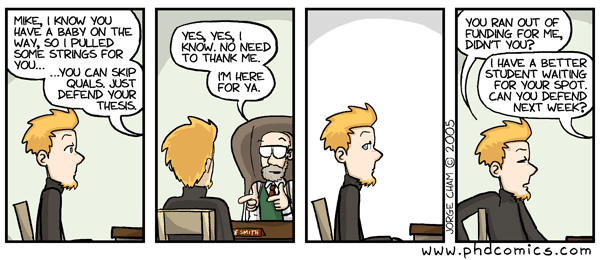09 Jan 2013
•
Academia
My friend Gabe from Macdrifter.com wrote a really neat guest essay for A Better Mess exploring his journey as a scientist, gaining expertise, and overshooting goals. It’s called Expertise Does Not Have Units and all of you researcher-types should read it immediately.
We measure length in feet, weight in pounds, time in seconds and expertise in failure. The problem with becoming an expert is that often there’s no beginning and no end. Worse, there’s no measure we can use to perceive our progress. This is my attempt at a retrospective measurement of my journey. […]
Over the years, chemistry became an escape for me. It was a topic that supplied an endless stream of ideas and small joys. I could play with thought experiments in my head as easily as normal people carry a tune.
I had a hard time picking a quote because I didn’t want to give away the best thoughts or where he landed. Suffice it to say there’s some real heart behind this that you don’t hear coming from many scientists.
03 Jan 2013
•
Academia
I’ve received a few inquiries for advice about the PhD thesis defense, so here is a compilation of the tips and resources that I found helpful.

Advice
Here is the net of the advice I received from colleagues mixed with my own recollections:
- Only a terrible human being of an advisor would let you proceed to the defense if they weren’t 99% sure you were going to pass.
- The defense is almost a formality. Almost. Prepare like you might fail, present knowing you are going to pass.
- Your committee wants you to succeed, and even if you feel they make unreasonable demands, the net result will almost certainly be an improved manuscript.
- You will know more about your topic than anyone present, including your advisor. Seriously, chill out.
- It’s impossible to talk about everything you did. You have to condense years of work into 45 minutes. Kill your darlings.
- Convey contributions early, convey contributions often.
- It’s common to question whether your contribution is substantial enough, but you are too close to the project now to have an objective opinion on this. Rely on your advisor and colleagues here.
- Practice it until you have premonition-like mastery of every single slide and transition. Practice it separately in front of colleagues and non-technical friends/family—both audiences will expose different weaknesses in your talk. I would estimate that ~10 full runs should put you in the ballpark in terms of preparation.
- You should probably re-read your thesis a day or two before the defense, but you don’t really need to study—you already know everything in it backward and forward. This review will highlight any weak spots in your memory that need a refresher.
- Profile your committee (PhD Comics nails it again). Try to meet with them in the weeks leading up to your defense to get some pre-defense feedback so you can short-circuit their major pushbacks during the big event. Talk to grad students of wild-card committee members to find out if there are any biases or key intel you need to know about. Knowing your allies will give you more confidence.
- The closed portion will probably not be too painful. Your committee—more than anything—wants to have an interesting discussion.
- Order good food, and order a lot if your defense is near a meal time. Mine was at 1pm, so I basically catered lunch. I wanted to be able to tell my committee that lunch would be provided to give some relief to their schedule, since they were already spending several hours on my defense.
- Encourage local friends and family to attend—this is one of the few opportunities they will ever have to see you in your element. I was glad they could share the experience, and a lot of them told me they enjoyed connecting the dots on what I’ve been spending years doing.
- Have fun—this is a once-in-a-lifetime experience.
What to expect
The defense format varies among universities and countries. Here is the standard anatomy of the defense in my department at Georgia Tech:
- 45-minute public talk on your research. Aside from your committee, other grad students, friends, and family are invited.
- Public Q&A. Typically, this portion is dominated by questions from other grad students, but don’t be surprised if your committee gets quite involved at this stage, especially if they have a question they think might benefit the general audience.
- After the general Q&A, your advisor will dismiss everyone but your committee. Ask for a 10-minute break during this transition to recoup, eat a quick snack, say goodbye to your fans, etc.
- The closed session. Here’s how it went for me: Each committee member got a chance to go through their series of questions one by one, during which the other members would chime in with clarifying/follow-up questions. We proceeded through each member like this until everyone was satisfied. It was neither adversarial nor intense.
- You are dismissed from the room while your committee deliberates whether you passed and works to consensus on what additional revisions they will require.
- Your advisor will open the door, invite you in, and say “Congratulations, Dr. __”. Enjoy this, it’s an incredible moment.
- Your advisor will typically summarize their discussion and convey additional requests from your committee. Go ahead and schedule a meeting for the next day because you are mentally spent by now and won’t remember anyway.
- Go celebrate! You are amazing.
Resources
On the lighter side, PhD Comics ran a great series on the defense several years ago. Start with this one and click ‘next’ through the series:
While not specifically aimed at the thesis defense, Matt Might’s piece on giving academic talks is the best resource I have ever found for this type of presentation:
Here is a long list of defense-specific articles that I found helpful:
Feedback?
I’d love to hear if there are any resources that I should add to the list. What do you remember from your defense that might help a fellow grad student? If you are a professor, what key advice do you give your grad students?
02 Jan 2013
•
Miscellany
John Roderick on his disdain for year-end top ten lists:
Compressing your emotional response to art into a 1-to-10 scale is robbing yourself of the appreciation of nuance. Albums are complete works of art: flawed, human, beautiful. Even the worst album I listened to last year couldn’t be properly described in four long paragraphs. Reducing an album’s worth of songs to a “five star” rating and a pithy sentence is painfully dumb.
On people who rely on top-ten lists for discovery:
I wonder–did they listen thoroughly to every record they bought last year? Did they listen to them all the way through, even? The people making records are still spending months and years on them, while the people buying them are munching through them like corn chips. Slow down.
Much broader application than just music here—there is much we encounter in life that requires time, patience, and perhaps effort to fully experience, appreciate, and learn from.
01 Jan 2013
•
Personal
This year had a dramatic ending for my family. During one week in mid-December, I defended my PhD and celebrated my 10th anniversary with my lovely wife. Our beautiful and brilliant daughter turned four. Incredible.
Getting to that point was less glamorous, easily the hardest year we can remember. I don’t feel like getting into all of that in a public forum, but suffice it to say, we are looking toward 2013 with renewed pursuit for healthier and happier times.
Having just completed a PhD, I expect this to be one of the only times in my adult life when the new year will be accompanied by more than just a symbolic opportunity to start over. The first quarter of this year will bring my first post-grad employment and relocation to a new city. It’s an exciting adventure, and my wife and I are eager to rediscover who we are in this new context.
All that to say, the word “resolution” rings a bit hollow to me right now. I am more or less undergoing a full reboot of my life’s rhythms and vision.
I want to say thank you to everyone who has taken the time to visit my little corner of the web this past year. I have enjoyed the conversations and count many of you friends. Once I upload my final thesis edits later this week, I have a lot planned for this site over the next year that I hope you will enjoy as much as I plan to.
Here’s to new beginnings!
05 Dec 2012
•
Photos
•
Structure

Here is a photograph from a recent trip to San Francisco. My wife and I rented a car to head across the bridge and enjoy the views from the Marin Headlands, but as you can see, the bridge was completely fogged in. Obviously, this was unacceptable to me, a structural engineer. The next day was much clearer so we got another car and properly checked off “Golden Gate Bridge” from the engineering landmark bucket list.

